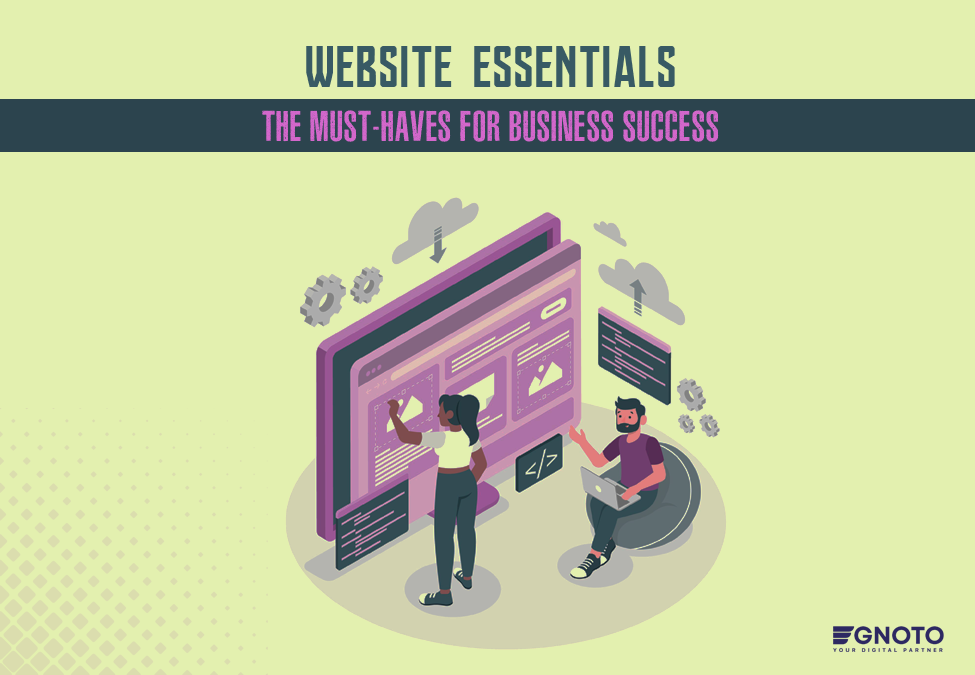Businesses may have different reasons for developing websites, but the goal is the same: to create a platform that attracts, engages, and converts visitors. A website is the face of a business, so it needs to be built with clear thoughts and decisions.
Often, a lack of purpose, poor designs, and slow website speed affect visitors’ experience. As a result, they never return to the site. If you are also planning to develop a website, focus on areas that not only align with your business needs but also improve customer experience.
Nowadays, people also don’t trust a business without a website. If you focus on some key elements when creating a website, you can generate trust and increase sales. So, are you ready for a strong web presence?
Explore key elements of an effective website that are essential for a successful website. Go through them in the sequence in which they are presented for better understanding.
1. Purpose & Human Psychology
- Clear Purpose:
Why do you want to build a website? A clear and undoubtful answer to this question can ensure 50% success of your website. Whether you want to increase sales, offer services, build your brand, or just want to educate the masses.
It’s like laying a solid foundation to begin website development. A clear purpose is even more important in today’s time to succeed when 175 websites go live every single minute.
- Human Psychology:
When you know how people think, feel, and act online, you design a website that appeals to their emotions. This makes navigation easy for them to take action. Moreover, you can understand which aspects of the site are easy, interesting, and confusing for the visitors. A carefully designed user experience (UX) can boost conversion rates by as much as 400%.
2. Website Structure and Design
- User-Friendly Design:
Since 75% of a website’s credibility comes from its design, focusing on it becomes inevitable. A website must be easy to navigate, visually appealing, and accessible because no one wants to figure out how to find what they need.
People even decide whether to stay on the website in a fraction of the time. Clean layouts, intuitive buttons, and hues selected after understanding human psychology help build user-friendly designs.
- Smooth Navigation:
Go through your competitors’ pages and figure out how people navigate them. You can also use analytics to determine what people want on your website and how they find it. Based on this data, create Intuitive navigation so visitors can effortlessly find products, services, and information.
- Informative Landing Page:
A landing page is one of the crucial elements of building a successful website. An informative landing page instantly tells visitors what your website is about. This is a standalone page, more like an infographic created specifically for marketing purposes.
It is where visitors land when they click on a link available on various platforms where you market the website. The image below shows the landing page conversion rates across different industries.
3. Content and Engagement
- Customer-Centric Content:
This element of a website helps to address the pain points of the audience. Before you write a single word on your website, understand your potential customers’ pain points, needs, and desires. It will help you offer them solutions effectively through blogs, videos, and guides. Moreover, there is a difference between a customer-friendly and a customer-centric approach. You need to focus on both while building a website.
- Customer Success Stories:
People trust people, not websites. Showcase your customers’ success stories, as this step generates trust in your website and product. Success stories, case studies, and testimonials help potential customers see how you have helped others and what level of services they can expect from your company.
So, let your customers do the talking about your products!
- Social Proof:
Social proof ensures potential customers that they are making the right decision by choosing you. Using reviews, ratings, and testimonials shows that other people enjoy using the website’s services. It influences potential customer’s thoughts and attracts them to your website.
4. Performance and Functionality
- Fast Load Times:
Elements like page load time highly affect website traffic. No matter how beautifully you have developed it, if the site takes more than 3 seconds to load, you can miss a large user base. An ideal page load time is between 0-2 seconds. So, if your website takes too long to load, visitors can leave before it even opens. You can keep your audience engaged with fast load times.
- Mobile Responsiveness:
More than 60% of websites are accessed through smartphones. If your website is not responsive, you can miss a larger user base. Start website development with a mobile-first approach so people can access it seamlessly across various devices. Focusing on this element will help you improve user experience, increase mobile traffic, and improve SEO performance.
- SEO Optimization:
Although SEO optimization is not part of website development, it has become crucial. If you want people to find your website easily, it’s crucial to optimize it for SEO, which helps the website appear in searches and increases traffic. WordPress and other content management tools help to build an SEO-friendly website. You can choose the best suit for your requirements.
- Analytics Integration:
To understand how your website is performing, you need to analyze data. By integrating analytics tools, you can track the number of visitors, leads, and other website activities. You can also track things like how visitors are finding your website and focus on sources where you want traffic from. Additionally, you can check website visits from a particular region at a particular time, helping to make informed decisions.
5. Security and Trust
- Security-Features:
Security becomes crucial because people know many frauds occur online. You can build trust among your visitors using SSL certificates, strong encryption, and secure transaction methods. Strong security features ensure your website is trustworthy and secure personal details. People often like a website overall, but when they realize it’s not trustworthy, they don’t buy stuff from it.
- Clear Contact Information:
If your visitors can’t find you, it’s a red flag. Always display clear contact information so that customers can reach you quickly and resolve their issues. Whether it is a phone number, email, or contact form, place it in the right location on your website. This ensures visitors can easily get help when needed.
How to Implement These Key Elements?
Now you know where to focus to make a website successful. However, if you make mistakes in the implementation, all your efforts can be ruined. Implementing key elements of effective website development requires careful planning, design, and UX experience, as well as knowledge of programming languages, tools, frameworks, and technologies.
To build a website, you must learn all these technologies to implement key elements effectively. You can also hire a development company and discuss these elements with them.
Focus on the points below before hiring a website development firm.
- Discuss your requirements clearly
- Compare at least 6 solution providers
- Decide on your budget
- Discuss post-launch support
- Check reviews and ratings
- Talk to existing customers
By considering these points, you can find the best website developer and discuss key elements with them. Well, experienced developers are already aware of what makes a website successful. Discussion with them will clear up all your doubts.
Wrapping Up
So, these are the key elements of a successful website that every business needs. You can implement them while building a website or discuss them with your developers to choose the best approach based on trends and customers. Begin with a clear purpose for building a website. It will help you create the platform, keeping audiences’ pain points in mind. Then, whatever you build will be the best for your website visitors.
Moreover, focus on website structure, UX, content, and security to create a complete package of functionality, reliability, and trust. By aligning these elements, your website will attract visitors and convert them into loyal customers.










